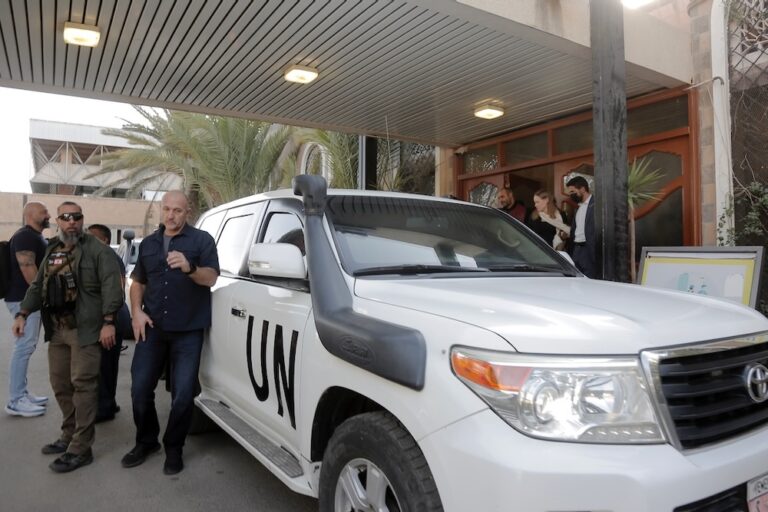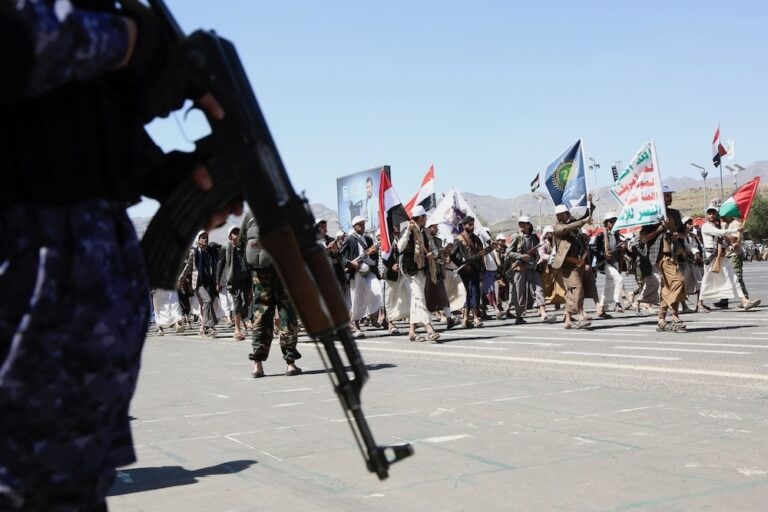(CPJ/IFEX) – CPJ is expressing its deep concern about the convictions handed down on the morning of 4 August 1999 by the Seera Court of First Instance against Hisham Basharaheel, editor of the thrice-weekly newspaper “Al-Ayyam”, and Ali Haitham Ghareeb, a reporter with the paper. **Updates IFEX alerts of 15 July, 18 May and 4 […]
(CPJ/IFEX) – CPJ is expressing its deep concern about the convictions handed
down on the morning of 4 August 1999 by the Seera Court of First Instance
against Hisham Basharaheel, editor of the thrice-weekly newspaper
“Al-Ayyam”, and Ali Haitham Ghareeb, a reporter with the paper.
**Updates IFEX alerts of 15 July, 18 May and 4 March 1999**
Both Basharaheel and Ghareeb were sentenced by Judge Mohsen Alwan to
suspended prison terms of six and ten months respectively on charges that
included “instigating national feuds,” “instigating the spirit of
separatism,” and “harming national unity.” The charges were filed in May in
response to an article written by Ghareeb published in the 27 February 1999
edition of “Al-Ayyam”, titled “Let’s Talk About Unity from the Social
Perspective.” The article criticized the structure of local government in
Yemen, where Southern provinces are governed by politicians from the North
of the country.
Basharaheel was additionally charged with violating a January 1999 court
order banning publication of court proceedings from the trial of a group of
British nationals who were then facing terrorism charges in Aden. The
article, published on 3 March, and titled “Lawyer Hmeidan Calls for
Dismissal of Trial of Her British Clients on Account of Improper Legal
Proceedings,” summarized a story by the British Broadcasting Corporation
(BBC), which reported that the lawyer for the eight men had urged that their
cases be dismissed on procedural grounds. It is unclear whether Basharaheel
was actually convicted of this charge, since the court did not release
details of the ruling.
In addition to the sentencing of Basharaheel and Ghareeb, Judge Alwan also
ruled against the prosecution’s request that “Al-Ayyam” be closed
indefinitely. The prosecution appealed against the quashing of the ban,
while “Al-Ayyam” has appealed the convictions of both journalists.
Although the court suspended the prison sentences handed down against
Basharaheel and Ghareeb, CPJ views their convictions as a flagrant violation
of the right to free expression as guaranteed under international law. It is
also a grave threat to press freedom in Yemen. We believe that the ruling
will have a chilling effect on journalists and will encourage
self-censorship in the press. Specifically with regard to “Al-Ayyam”, we
note with concern that the suspended prison sentences against Basharaheel
and Ghareeb could be enforced if both journalists are convicted of a similar
offense during the next six to ten months, according to a lawyer
representing the newspaper.
We are encouraged by Prime Minister Abdel Karim al-Iryani’s statements to
CPJ vice chairman Terry Anderson, during their meeting in Sanaa last month,
about the Yemeni government’s commitment to safeguarding the rights of
journalists in Yemen. In that meeting the prime minister said the Yemeni
government was “committed to freedom of the press,” and that it is “ready to
listen to any report of a violation and ready to take action.”
Recommended Action
Send appeals to the prime minister:
that
the convictions against Hisham Basharaheel and Ali Haitham Ghareeb be
rescinded
halting the criminalization of journalism in Yemen, and to enact legal
safeguards that will guarantee the right of journalists to practice their
profession freely without reprisal from the state
Appeals To
His Excellency Prime Minister Abdel Karim al-Iryani
c/o His Excellency Ambassador Abdul Wahab al-Hajjri
Embassy of the Republic of Yemen
2600 Virginia Avenue, N.W.
Washington, DC 20037
Fax: +202 337 2017
Please copy appeals to the source if possible.


